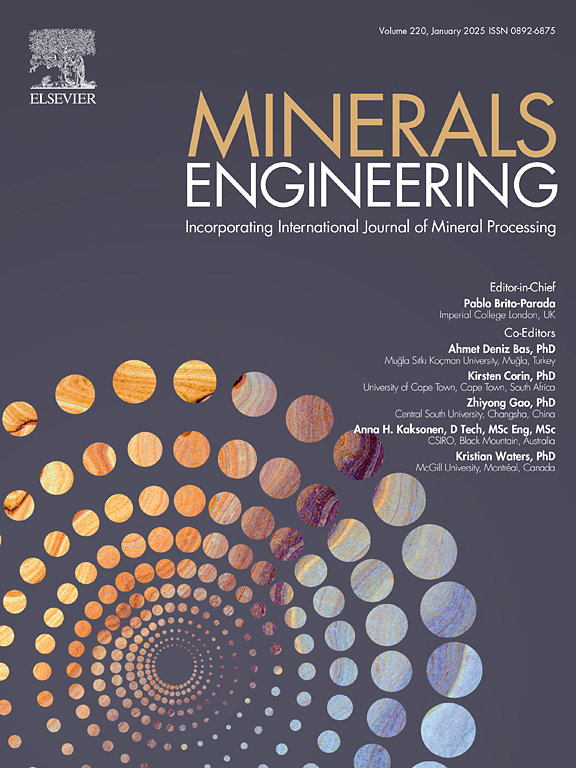Enhancement mechanism of metal ions on the flotation behavior of muscovite in sodium oleate system
IF 4.9
2区 工程技术
Q1 ENGINEERING, CHEMICAL
引用次数: 0
Abstract
Metal ions have been employed to improve the flotation efficiency of muscovite, yet the underlying enhancing mechanisms remain unclear. In this study, we systematically investigated the improvement in muscovite flotation by adding metal ions with different valence states (K+, Ca2+, and Al3+). Flotation experiments revealed that the muscovite recovery rate increased from approximately 10 % to over 70 % with the addition of Ca2+ and Al3+, while it decreased to less than 1 % with the introduction of K+. Fourier Transform Infrared spectrophotometer (FT-IR), contact angle tests, and zeta potential analysis confirmed the significant changes in the surface properties of muscovite after binding with K+, Ca2+, and Al3+. Surface electrostatic potential (ESP) results indicated that the muscovite surface exhibited positive electrostatic potential in the presence of these metal ions, facilitating the adsorption of collectors (NaOL) and enhancing the flotation recovery of muscovite. Furthermore, molecular dynamics (MD) simulations demonstrated that the enhancing effect of Al(OH)2+ on collector adsorption was more pronounced than that of AlOH2+, attributed to the better dispersion of the OL-Al(OH)2 complex compared to the 2OL-AlOH complex. These findings provide new insights into the complexation between metals and anionic collectors, and improving the flotation effect of minerals through metal ions has significant potential for industrial applications.
金属离子对油酸钠体系中麝香石浮选行为的增强机制
金属离子被用来提高麝香石的浮选效率,但其潜在的提高机制仍不清楚。在本研究中,我们系统地研究了添加不同价态的金属离子(K+、Ca2+ 和 Al3+)对麝香石浮选的改善作用。浮选实验表明,加入 Ca2+ 和 Al3+ 后,黝帘石的回收率从约 10% 提高到 70% 以上,而加入 K+ 后,回收率则下降到不足 1%。傅立叶变换红外分光光度计(FT-IR)、接触角测试和 zeta 电位分析证实,与 K+、Ca2+ 和 Al3+ 结合后,麝香石的表面性质发生了显著变化。表面静电电位(ESP)结果表明,在这些金属离子存在的情况下,麝香石表面表现出正的静电电位,有利于捕收剂(NaOL)的吸附,提高了麝香石的浮选回收率。此外,分子动力学(MD)模拟表明,Al(OH)2+ 对捕收剂吸附的促进作用比 AlOH2+ 更明显,这归因于 OL-Al(OH)2 复合物比 2OL-AlOH 复合物具有更好的分散性。这些发现为金属与阴离子捕收剂之间的络合提供了新的见解,通过金属离子改善矿物的浮选效果在工业应用中具有巨大潜力。
本文章由计算机程序翻译,如有差异,请以英文原文为准。
求助全文
约1分钟内获得全文
求助全文
来源期刊

Minerals Engineering
工程技术-工程:化工
CiteScore
8.70
自引率
18.80%
发文量
519
审稿时长
81 days
期刊介绍:
The purpose of the journal is to provide for the rapid publication of topical papers featuring the latest developments in the allied fields of mineral processing and extractive metallurgy. Its wide ranging coverage of research and practical (operating) topics includes physical separation methods, such as comminution, flotation concentration and dewatering, chemical methods such as bio-, hydro-, and electro-metallurgy, analytical techniques, process control, simulation and instrumentation, and mineralogical aspects of processing. Environmental issues, particularly those pertaining to sustainable development, will also be strongly covered.
 求助内容:
求助内容: 应助结果提醒方式:
应助结果提醒方式:


